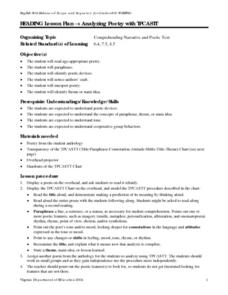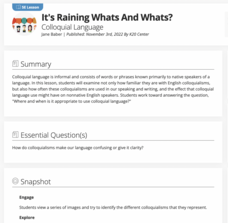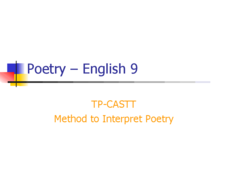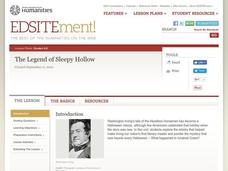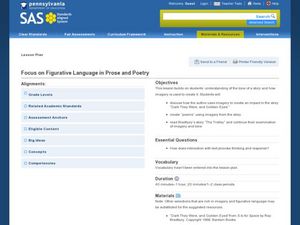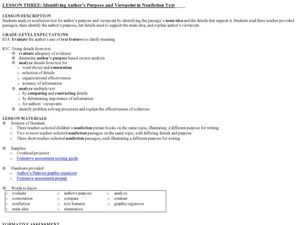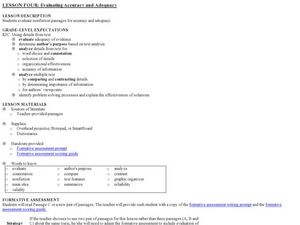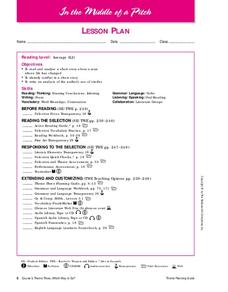Curated OER
Analyzing Poetry with TPCASTT
Middle schoolers read a poem and complete a TPCASTT chart. They make a prediction about the title (T) , paraphrase each line (P), identify poetic devices and nuances (C-connotation), explore mood and tone (A-attitude), point out shifts...
K20 LEARN
It’s Raining Whats and Whats? Colloquial Language
"Yuns betta outten the lights!" Colloquial language is the focus of a lesson that asks middle schoolers to consider the pros and cons of using idioms. They read articles, match expressions with their meaning and place of origin, and...
Novelinks
Words by Heart: Guided Imagery
Sad, depressed, miserable, inconsolable, forlorn: so many synonyms have a lot of variety with their connotations. Through the guided imagery activity, writers explore the use of connotation and its influence on imagery and description by...
Alabama Learning Exchange
Poetry-English 9
Are your readers lost in the world of poetry? Show them this basic presentation to study elements of a poem. They learn the importance of the title, paraphrasing, connotation, tone, shifts, and theme.
Novelinks
The Little Prince: Brainstorming Activity
What do you think of when you hear the word adult? Or friend? Learners brainstorm with a group of peers to list the words they think of when they hear seven words from Antoine de Saint-Exupéry's The Little Prince.
Curated OER
Poetry Analysis Device: TPCASTT
Students analyze the key elements of poetry using a mnemonic device. The device: TPCASTT (title, paraphrase, connotation, attitude, shifts, title and theme).
Ereading Worksheets
Figurative Language for Edgar Allen Poe
Are your classes weary of dreary worksheets? Are the learners nearly napping? Thrill them, fill them with delight with an interactive worksheet that asks them to identify the figurative language Edgar Allen Poe uses to add horror and...
Curated OER
Analyzing Literary Devices
Eighth graders identify figurative language and poetry in this literary analysis lesson. Using Through the Looking Glass by Lewis Carroll and a YouTube video for "The Walrus and the Carpenter," young readers complete a literary device...
Syracuse City School District
Reading Comprehension Unit Plan
A unit plan uses short texts to teach literary elements such as theme and characterization. Included are passages by authors such as Walter Dean Myers and Sandra Cisneros. Activities include quick writes, filling in graphic organizers,...
Monarch High School
TP-CASTT Practice
Acronyms can help learners remember facts and analyze poetry. This resource includes graphic organizers for TP-CASTT, SOAPS, SOAPSTone, and DIDLS. Class members can try out one or all of these strategies to assist with that difficult job...
Curated OER
The Legend of Sleepy Hollow
Explore Washington Irving's "The Legend of Sleepy Hollow" in this literature analysis instructional activity. Middle schoolers read and summarize the plot of the story. They then adapt passages for a contemporary audience and analyze the...
Curated OER
Phineas Gage: Questioning Strategy
Focus on chapter two of Phineas Gage: A Gruesome but True Story About Brain Science with a questioning activity. After teaching and modeling several types of questions, learners work with partners and then independently to answer and...
Curated OER
Focus on Figurative Language in Prose and Poetry
Young scholars place emphasis on the use of figurative language when analyzing prose and poetry. In this figurative language activity, students explore the tone of a story and its imagery. Young scholars read and discuss how the author...
Curated OER
Identifying Author’s Purpose and Viewpoint in Nonfiction Text
Why do people write books? Pupils discover how to identify the author's viewpoint. They read non-fiction passages their instructor selects (the plan has the class look at nonfiction children's picture books), and then identify the...
Curated OER
Evaluating Accuracy and Adequacy
Evaluate non-fiction works with your English class. While practicing a variety of strategies detailed in the plan, readers compare and contrast the information in three non-fiction passages about the same topic. They then discuss the...
Curated OER
Which Way To Go?
Students prepare for and respond to literature selections. This package of lessons includes nine lessons from the American Literature series, each covering a different reading selection about a man making a key life decision. Pre-reading...


